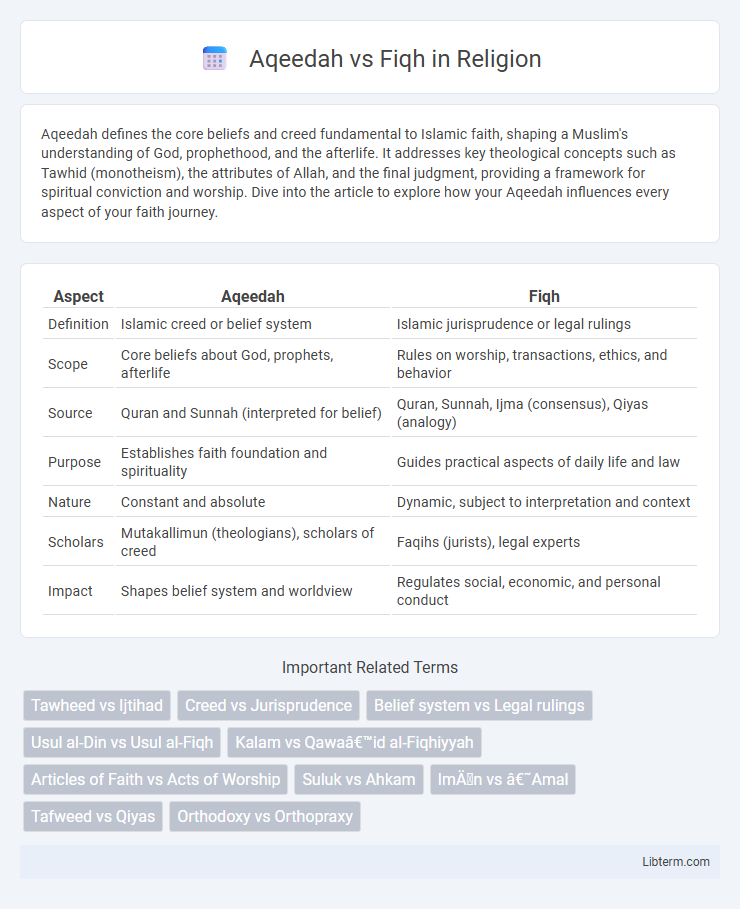Aqeedah defines the core beliefs and creed fundamental to Islamic faith, shaping a Muslim's understanding of God, prophethood, and the afterlife. It addresses key theological concepts such as Tawhid (monotheism), the attributes of Allah, and the final judgment, providing a framework for spiritual conviction and worship. Dive into the article to explore how your Aqeedah influences every aspect of your faith journey.
Table of Comparison
| Aspect | Aqeedah | Fiqh |
|---|---|---|
| Definition | Islamic creed or belief system | Islamic jurisprudence or legal rulings |
| Scope | Core beliefs about God, prophets, afterlife | Rules on worship, transactions, ethics, and behavior |
| Source | Quran and Sunnah (interpreted for belief) | Quran, Sunnah, Ijma (consensus), Qiyas (analogy) |
| Purpose | Establishes faith foundation and spirituality | Guides practical aspects of daily life and law |
| Nature | Constant and absolute | Dynamic, subject to interpretation and context |
| Scholars | Mutakallimun (theologians), scholars of creed | Faqihs (jurists), legal experts |
| Impact | Shapes belief system and worldview | Regulates social, economic, and personal conduct |
Understanding Aqeedah: Foundations of Islamic Belief
Aqeedah, the core of Islamic theology, establishes the foundational beliefs about Allah, Prophethood, and the afterlife that every Muslim must affirm. It distinguishes itself from Fiqh, which deals with the practical application of Islamic law and rituals derived from the Quran and Sunnah. Mastery of Aqeedah ensures a clear comprehension of Islamic creed, guiding believers in faith and spirituality beyond legalistic practices.
Defining Fiqh: The Framework of Islamic Law
Fiqh represents the comprehensive framework of Islamic law derived from the Quran, Hadith, consensus (Ijma), and analogy (Qiyas), governing the practical aspects of worship, transactions, and personal conduct. It provides detailed rulings that guide Muslims on daily practices, ensuring adherence to Sharia principles while accommodating diverse circumstances. Unlike Aqeedah, which deals with core Islamic beliefs, Fiqh emphasizes the legal methodology that shapes ethical and social conduct within an Islamic context.
Core Differences Between Aqeedah and Fiqh
Aqeedah represents the foundational beliefs and creed in Islam, encompassing core theological principles such as the oneness of God, prophethood, and the afterlife. Fiqh, on the other hand, deals with the practical application of Islamic law derived from the Quran and Sunnah, focusing on rituals, transactions, and moral conduct. The core difference lies in Aqeedah addressing spiritual and doctrinal faith, while Fiqh governs daily actions and legal rulings.
Sources of Aqeedah and Fiqh in Islam
The primary sources of Aqeedah in Islam are the Qur'an and the authentic Hadith, which establish fundamental beliefs about God, prophethood, and the afterlife. Fiqh, or Islamic jurisprudence, derives its rulings from the Qur'an, Hadith, Ijma (consensus), and Qiyas (analogical reasoning), focusing on practical laws and daily worship. Aqeedah addresses core theological principles, while Fiqh governs legal obligations and societal conduct, each relying on their respective sources to guide Muslim faith and practice.
The Role of Aqeedah in Shaping Muslim Identity
Aqeedah, the core Islamic creed, defines a Muslim's beliefs about the oneness of Allah, prophethood, and the afterlife, serving as the foundation of spiritual identity and worldview. Fiqh, or Islamic jurisprudence, governs actions and legal rulings but is built upon the principles established by Aqeedah. The role of Aqeedah in shaping Muslim identity is pivotal, as it influences religious practices, moral values, and a sense of belonging within the Muslim community.
Fiqh: Regulating Daily Life and Worship
Fiqh governs the practical rules of daily life and worship, providing detailed guidance on rituals such as prayer, fasting, and zakat according to Islamic law. It interprets Quranic injunctions and Sunnah to address contemporary issues like finance, marriage, and criminal justice, ensuring compliance with Sharia. Scholars use consensus and analogy to adapt Fiqh rulings to evolving societal contexts without compromising core religious principles.
Interrelationship Between Aqeedah and Fiqh
Aqeedah, the Islamic creed, forms the foundational beliefs shaping a Muslim's worldview, while Fiqh encompasses the jurisprudential rulings derived from Shariah to govern actions. The interrelationship between Aqeedah and Fiqh is crucial as correct belief (Aqeedah) underpins the validity and sincerity of worship acts prescribed by Fiqh. A deviation in Aqeedah can render actions invalid regardless of compliance with Fiqh rulings, highlighting the inseparable link guiding a comprehensive Islamic way of life.
Historical Development of Aqeedah and Fiqh
The historical development of Aqeedah centers on the codification of Islamic beliefs and theological doctrines during the early centuries of Islam, particularly through the works of scholars like Imam Abu Hanifa and Imam Ash'ari. Fiqh evolved concurrently as the legal framework governing Muslim conduct, with foundational texts emerging from scholars such as Imam Malik and Imam Shafi'i, shaping the jurisprudential schools. Both disciplines reflect dynamic interactions between scripture, rationalism, and community needs across Islamic history, influencing religious practice and thought.
Common Misconceptions About Aqeedah vs Fiqh
A common misconception about Aqeedah and Fiqh is that they are interchangeable or equally flexible; Aqeedah refers to the core Islamic beliefs that are immutable and foundational, while Fiqh involves Islamic jurisprudence subject to interpretation and adaptation based on context. Many mistakenly treat Aqeedah issues as matters of personal opinion, undermining its role as the non-negotiable framework of faith. Understanding the distinction ensures clarity in Islamic studies, highlighting Aqeedah as the spiritual creed and Fiqh as practical legal rulings derived from the Quran and Sunnah.
Importance of Balancing Aqeedah and Fiqh in Practice
Balancing Aqeedah and Fiqh is essential for a holistic Islamic practice, ensuring that faith (Aqeedah) upholds the core beliefs while Fiqh governs the practical application of Shariah law. An imbalance can lead to either rigid dogmatism or superficial religiosity, undermining spiritual integrity and ethical conduct. Integrating sound Aqeedah with accurate Fiqh promotes authenticity, guiding Muslims to live with both conviction and compliance to divine guidance.
Aqeedah Infographic

 libterm.com
libterm.com